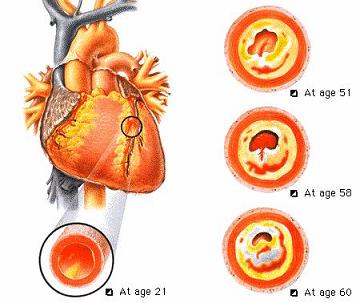The amount of cholesterol in the human body is controlled by cellular molecules that are called LDL-receptors. These molecules allow LDL-cholesterol to attach to and be used by the cell. LDL-cholesterol accumulates in blood in large amounts when the LDL-cholesterol in the body far exceeds the number of available LDL-receptors. This condition most commonly occurs in people whose diets are high in cholesterol or in saturated fats. Saturated fats are found primarily in animal fats and in certain vegetable fats, such as coconut oil and palm oil.
People also may have high cholesterol levels if they have an abnormal gene that prevents a full number of LDL-receptors from forming. This inherited disorder is called familial hypercholesterolemia. Other factors that can cause high blood cholesterol include a malfunctioning thyroid gland, kidney disease, diabetes, and the use of various medicines, including certain diuretics.
|


